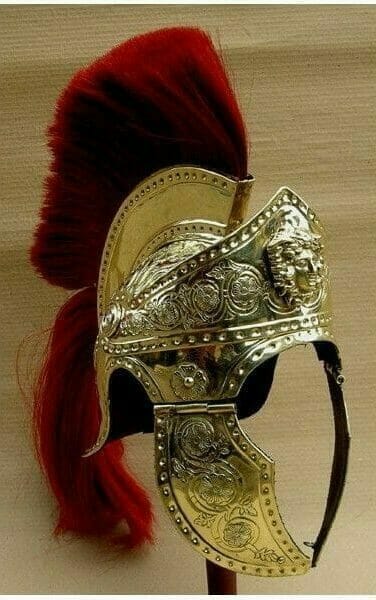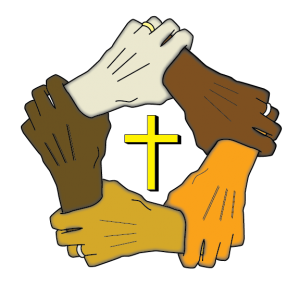Armor of the Lord (part 4 Helmet of Salvation)
Oct 4, 2015 // By:Dave // No Comment
Last week, I wrote about the shield of faith (pt 3)
This week, lets look at “helmet of salvation” (Eph 6:17)

The roman helmet (galea), depicted here, does more than cover the top of head. It has features not available even in modern helmets such as protection for back of neck and for temples and cheek area down to jawbone.
This one is rebuilt from what was believed to be a Praetorian Guard helmet … 
(note the extra ornamentation signifying value of helmet ascribed to value of wearer.)
While the ornamentation changes, the plume may change in position, size or color, the three areas of protection remain the same;
- head
- back of neck
- sides of head and jaw
Every soldier, every member of the Roman army benefited from same protection. (no partiality or special benefits from one to another when it came to the helmet)
I’m here to say that the same thing goes for the helmet of salvation for every member of God’s family. There is no partiality from one believer to another. Each one of us is saved completely and totally, securely held in the Father’s hand so much so that there is no one or nothing that can remove us from His saving hands (nothing can get through His Helmet of Salvation, nothing) Romans 8:31-39, Eph 1:13, 2 Cor 1:21-22.
- Our head is protected (that is our very life), justified.
- our neck is protected, (that is how our head controls our body to move and act), sanctified
- our facial sides are protected as well as sides of mouth (how we see and communicate what we see to others), seeing our glorified future and communicating that back to the present struggle for our own encouragement and for others.
Let’s take a look at “salvation” as an applicable mechanism for a helmet in Paul’s metaphor: (I’m not claiming that this is what Paul was communicating, but just hoping to provide a tool for memorization of the three phases of salvation)
- Justification. Trusting in Jesus Christ, immediately saves from the penalty of sin. For believers, this first aspect of salvation, which is justification, is past. It was accomplished the moment we trusted in Christ, and that particular act of faith need never be repeated, because we are secure in our Father’s hands—from whom, as we have just seen, we can never be snatched (John 10:28–29). We are forever saved from condemnation (Rom. 8:1).
- Sanctification. The second aspect of salvation involves our life on earth, during which time we experience a measure of freedom from the dominating power of sin. Being now under God’s grace, sin no longer has mastery over us; we are no longer sin’s slave but God’s (Rom. 6:14, 18–22). Paul shows these first two aspects of salvation side by side in the previous chapter of Romans: “For if while we were enemies, we were reconciled to God through the death of His Son, much more, having been reconciled, we shall be saved by His life” (5:10). Christ’s death saved us once and for all from sin’s penalty, and His life within us now is saving us day to day from sin’s power and mastery.
- Glorification. The third aspect of salvation is future, when we shall one day be saved completely and eternally from sin’s presence. Looking forward to that glorious time, John says, “Beloved, now we are children of God, and it has not appeared as yet what we shall be. We know that, when He appears, we shall be like Him, because we shall see Him just as He is” (1 John 3:2). To be like God is to be without sin. We rejoice that this aspect of our salvation “is nearer than when we believed” (Rom. 13:11).
It is this final aspect of salvation that is the real strength of the believer’s helmet.
If we lose hope in the future promise of salvation, there can be no perception of security in the present(which reduces us to children living in fear of every failure) . This, no doubt, is why Paul calls this same piece of armor “the helmet” which is “the hope of salvation” (1 Thess. 5:8). “Having the first fruits of the Spirit,” Paul explains in Romans, “even we ourselves groan within ourselves, waiting eagerly for our adoption as sons, the redemption of our body. For in hope we have been saved” (8:23–24). The helmet of salvation is that great hope of final salvation that gives us confidence and assurance that our present struggle with Satan will not last forever and we will be victorious in the end. We know the battle is only for this life, and even a long earthly life is no more than a split second compared to eternity with our Lord in heaven. We are not in a race we can lose. We have no purgatory to face, no uncertain hope that our own continued efforts or those of our loved ones and friends will perhaps some day finally make us acceptable to God. We know that whom God “predestined, these He also called; and whom He called, these He also justified; and whom He justified, these He also glorified” (Rom. 8:30). There is not the loss of a single soul from predestination to justification to sanctification to glorification. That is God’s unbroken and unbreakable chain of salvation (cf. John 6:39–40; 10:27–30).
We have a certain hope, “a living hope,” as Peter calls it. (1 Pet. 1:3–5).
When the helmet of that hope is in place, we can “greatly rejoice, even though now for a little while, if necessary, [we] have been distressed by various trials, that the proof of [our] faith, being more precious than gold which is perishable, even though tested by fire, may be found to result in praise and glory and honor at the revelation of Jesus Christ; and though [we] have not seen Him, [we] love Him, and though [we] do not see Him now, but believe in Him, [we] greatly rejoice with joy inexpressible and full of glory, obtaining as the outcome of [our] faith the salvation of [our] souls” (vv. 6–9). That is the salvation which is our helmet. Our helmet is the certain prospect of heaven, our ultimate salvation, which “we have as an anchor of the soul” (Heb. 6:19).
Often when a runner is on the home stretch of a race he suddenly “hits the wall,” as the expression goes. His legs wobble and refuse to go any farther. The only hope for the runner is to keep his mind on the goal, on the victory to be won for himself and his team. It is that hope that keeps him going when every other part of his being wants to give up.
Paul wrote words parallel to the thought to the Thessalonians: “Since we are of the day, let us be sober, having put on the breastplate of faith and love, and as a helmet, the hope of salvation. For God has not destined us for wrath, but for obtaining salvation through our Lord Jesus Christ, who died for us, that whether we are awake or asleep, we may live together with Him. Therefore encourage one another, and build up one another, just as you also are doing” (1 Thess. 5:8–11).
Jude wrote to persecuted Christians giving sobering warnings about false teachers, “ungodly persons who turn the grace of our God into licentiousness and deny our only Master and Lord, Jesus Christ” (v.4). But he begins the letter by addressing believers as “those who are the called, beloved in God the Father, and kept for Jesus Christ” (v.1). Tereo (the verb behind “kept”) means to guard, keep watch over, and protect. God Himself guards, watches over, and protects every person who belongs to Him. Jude ended the letter by assuring believers that He “is able to keep you from stumbling, and to make you stand in the presence of His glory blameless with great joy” (v. 24; cf.a 1 Thess. 5:23). The word behind “keep” in this verse is not tereo, as in verse 1, but phulasso, which means securing in the midst of an attack. No matter what our spiritual enemies may throw against us, we are secured by God’s own power.
We have total security in the power of God for our sealed justification, empowered sanctification, and joyous anticipation of our eternal glorification. Our helmet of salvation reminds us of our saved life (determined once and for all in the past), our present struggle with sin will result in God’s work every active in us (present), and eternal life with Jesus Christ apart from sin (future). we’re covered from past, present to future by the hand of the great I AM, who was and is and is to come, yet unchanged !!

next week, sword of the spirit … 🙂
in His service, Dave Cadieux


